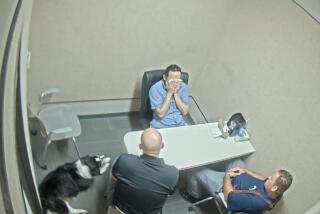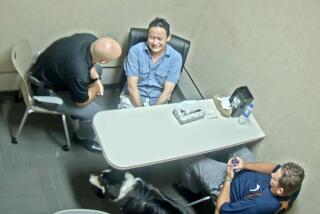Gunman’s Life Was a Spiral of Crime, Drugs
- Share via
GRANADA HILLS — Terry James Parker allegedly broke into and vandalized neighbors’ homes as a youth. He began drinking beer and smoking crack cocaine at 13. And he sometimes heard voices that weren’t there.
But the 25-year-old really began slipping, according to court records and his father, after Los Angeles police officers shot and wounded him in 1994.
Three months after he was shot--by LAPD officers who were later disciplined by Chief Willie L. Williams for using “unauthorized tactics”--he seemed to summon the police, firing a handgun throughout his stucco home while his father fled to call 911, and continuing to fire randomly after police arrived.
After he was flushed out of the Mission Hills home with tear gas and arrested, he told investigators he had wanted the police to “come back and finish the job,” according to a probation report.
Neither police nor neighbors nor even Parker’s father, James Parker, was shocked when the troubled man shot and critically wounded a California Highway Patrol officer Wednesday and then died in a storm of LAPD bullets.
“I knew right away what was happening,” said neighbor Jose Freire. “I knew it was Terry.” Speaking from a bullet-riddled home still wrapped in yellow police tape, James Parker said his son had become convinced that police were conspiring against him.
The elder Parker, who turned 63 Wednesday, had come to California from his new home in Bullhead City, Ariz., when his son was paroled from prison in June. The two had planned to return to Arizona today, but there had been some problems with his son’s parole paperwork.
“My son would say to me, ‘Dad, they’re not going to let me leave here. This is where I get into all my trouble, with my friends. We’ve been talking a long time about going to Arizona for a new start.’ ”
“I told him it wasn’t a conspiracy, it was just bureaucrats, but he was really paranoid about it,” said James Parker, who was in the bathroom when the firing started at the front door.
Parker’s troubles started when he was young, according to court records.
His “mother left the home when he was young, and [Parker] seemed to take it personally,” the 1994 probation report says. His “grandmother moved into the home to help take care of him. When she died, the defendant became depressed and would refuse to go to school. About this time, [Parker] began to use alcohol and abuse drugs.”
He would go on to complete just six years of formal education, according to the report.
His problems with the law, including arrests for drug possession and evading police, go back at least four years. Juvenile court records are sealed.
But after he was shot two years ago, Parker seemed to fall apart, his problems exacerbated by heavy drinking and a crack cocaine habit that cost as much as $80 a day, his father said.
A handwritten notation on court records dated July 11, 1994, one day after he was arrested for firing the gun in his house, reads: “Defendant needs psychiatric treatment immediately. He is hearing voices and is suicidal.”
A July 21 notation described his behavior as erratic.
San Fernando Municipal Judge Richard L. Brand ordered sheriff’s officials to have Parker checked by a mental health professional. And Deputy Public Defender Tom Gordon, who handled both of Parker’s 1994 cases, filed a motion seeking appointment of a USC psychiatric expert.
Gordon said in an interview Wednesday that the appointment was for diagnostic purposes, and that Parker was never deemed incompetent to stand trial.
In October 1994, a county probation officer wrote that Parker “will occasionally speak to himself,” and “claims occasionally to hear voices of people who are not there.”
After serving about two years in California State Prison at Solano for firearms violations and drug crimes, Parker was looking forward to moving with his father to Arizona. It was to have been his “big day,” the father said.
“It’s a hell of a way to lose your son,” James Parker said. “I didn’t realize until later that he shot a cop. He shouldn’t have done that. It was wrong.”
Times correspondent Darrell Saltzman contributed to this report.
More to Read
Sign up for Essential California
The most important California stories and recommendations in your inbox every morning.
You may occasionally receive promotional content from the Los Angeles Times.













